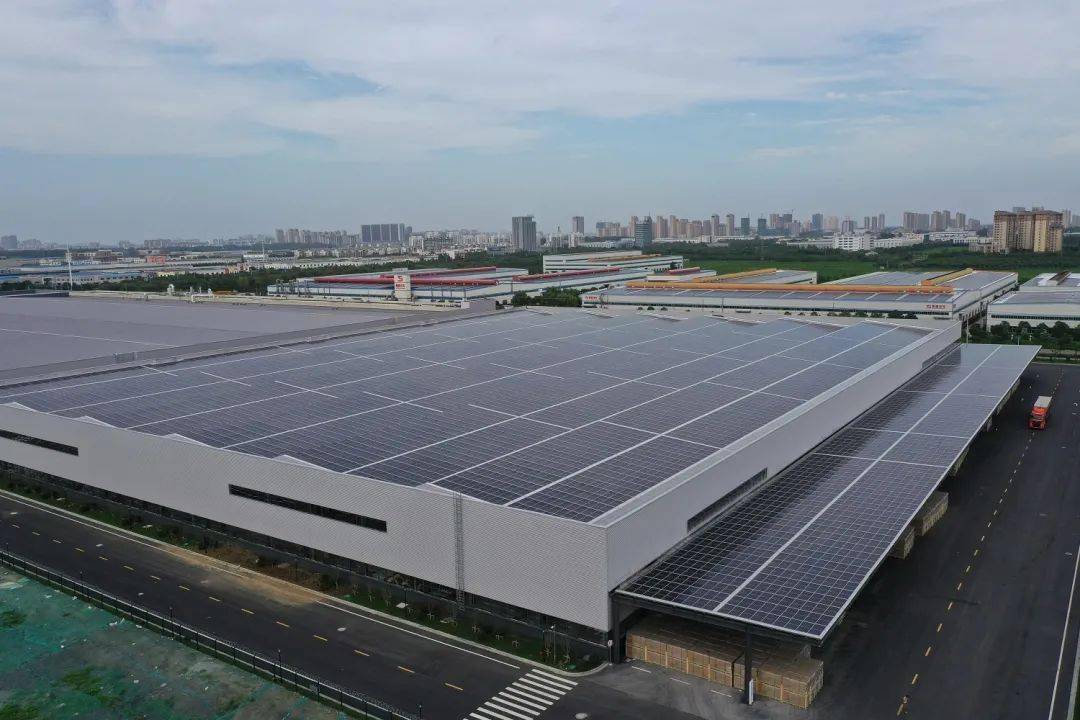集中式大型并網光伏電站就是利用荒漠,集中建設大型光伏電站,發電直接并入公共電網,接入高壓輸電系統供給遠距離負荷。中式大型并網光伏電站一般是級電站主要特點是將所發電能直接輸送到電網,有電網統一調配向用戶供電。但這種電站投資大建設周期長占地面積大,分布式小型并網光伏系統,就是各家各戶利用屋頂進行光伏發電,供用戶自己使用,多余的電量并入公共電網。
Centralized large-scale grid connected photovoltaic power stations refer to the use of deserts by the state to build large-scale photovoltaic power stations, which generate electricity directly into the public power grid and connect to the high-voltage transmission system to supply long-distance loads. Chinese large-scale grid connected photovoltaic power plants are generally national level power plants. The main feature is to directly transmit the generated energy to the power grid, and there is a unified allocation of power to users by the power grid. But this type of power station has a large investment, long construction period, and a large area. Distributed small-scale grid connected photovoltaic systems are used by households to generate photovoltaic power on the roof for their own use, and the excess electricity is integrated into the public grid.
分布式光伏電站與集中式光伏電站的并網區別:
Differences in grid connection between distributed photovoltaic power plants and centralized photovoltaic power plants:
分布式基本原則:主要基于建筑物表面,就近解決用戶的用電問題,通過并網實現供電差額的補償與外送。
Distributed basic principle: mainly based on the surface of buildings, to solve the electricity consumption problems of users nearby, and to achieve compensation and external transmission of power supply differences through grid connection.
優點:
Advantages:
光伏電源處于用戶側,發電供給當地負荷,視作負載,可以有效減少對電網供電的依賴,減少線路損耗。

Photovoltaic power supply is located on the user side, generating electricity to supply local loads as loads, which can effectively reduce dependence on grid power supply and reduce line losses.
充分利用建筑物表面,可以將光伏電池同時作為建筑材料,有效減少光伏電站的占地面積。
By fully utilizing the surface of buildings, photovoltaic cells can be simultaneously used as building materials, effectively reducing the floor area of photovoltaic power plants.
與智能電網和微電網的有效接口,運行靈活,適當條件下可以脫稿電網獨立運行。
Effective interface with smart grids and microgrids, flexible operation, and independent operation of the grid under appropriate conditions.
缺點:
Disadvantages:
配電網中的潮流方向會適時變化,逆潮流導致額外損耗,相關的保護都需要重新整定,變壓器分接頭需要不斷變換,等問題。
The direction of the power flow in the distribution network will change in a timely manner, and the reverse flow will cause additional losses. Relevant protection needs to be reset, and transformer taps need to be constantly changed.
電壓和無功調節的困難,大容量光伏的接入后功率因數的控制存在技術型難題,短路電力也將增大。
The difficulties in voltage and reactive power regulation, as well as the technical difficulties in controlling the power factor after the connection of large capacity photovoltaic, will also increase the short-circuit power.
需要在配電網級的能量管理系統,在大規模光伏接入的情況下進行負載的同一管理。對二次設備和通訊提供了新的要求,增加了系統的復雜性。
The energy management system at the distribution network level needs to manage the same load in the case of large-scale photovoltaic access. New requirements have been placed on secondary equipment and communication, increasing the complexity of the system.
集中式光伏電站:
Centralized photovoltaic power station:
集中式基本原則:充分利用荒漠地區豐富和相對穩定的太陽能資源構建大型光伏電站,接入高壓輸電系統供給遠距離負荷。
The basic principle of centralization: fully utilize the abundant and relatively stable solar energy resources in desert areas to build large-scale photovoltaic power stations, and connect them to high-voltage transmission systems to supply long-distance loads.
優點:
Advantages:
由于選址更加靈活,光伏出力穩定性有所增加,并且充分利用太陽輻射與用電負荷的正調。
Due to more flexible site selection, the stability of photovoltaic output has been increased, and the positive adjustment of solar radiation and electricity load has been fully utilized.
運行方式較為靈活,相對于分布式光伏可以更方便的進行無功和電壓控制,參加電網頻率調節也更容易實現。
The operation mode is relatively flexible, making it more convenient to control reactive power and voltage compared to distributed photovoltaics. Participating in grid frequency regulation is also easier to achieve.
建設周期短,環境適應能力強,不需要水源燃煤運輸等原料保障,運行成本低,便于集中管理,受到空間的限制小,可以很容易地實現擴容。
Short construction period, strong environmental adaptability, no need for raw material guarantee such as water source and coal transportation, low operating cost, easy centralized management, and limited by space, it can easily achieve expansion.
缺點:
Disadvantages:
需要依賴長距離輸電線路送電入網,同時自身也是電網地一個較大地干擾源,輸電線路的損耗電壓跌落無功補償等問題將會凸顯。
It is necessary to rely on long-distance transmission lines for power transmission into the grid, and at the same time, it is also a major source of interference to the power grid. The problems of loss, voltage drop, reactive power compensation, etc. of transmission lines will become prominent.
大容量的光伏電站由多臺變換裝置組合實現,這些設備的協同工作需要進行同一管理,目前這方面技術尚不成熟。
Large capacity photovoltaic power plants are implemented by combining multiple conversion devices, and the collaborative work of these devices requires the same management. Currently, this technology is not yet mature.
為保證電網安全,大容量的集中式光伏接入需要有LVRT等新的功能,這一技術往往與孤島存在沖突。
To ensure the safety of the power grid, large capacity centralized photovoltaic access requires new features such as LVRT, which often conflicts with isolated islands.
With the summary on distributed photovoltaic power generation, I hope it can be helpful to our customers. If you have any questions or need help, please click on our website: http://www.51dwgw.cn Or call for consultation, and we will do our best to solve it for you



 TEL:0531-82390078
TEL:0531-82390078 TEL:18805312017
TEL:18805312017 MAI:sdzdny001@163.com
MAI:sdzdny001@163.com 公司地址: 濟南市歷下區山大路157號
公司地址: 濟南市歷下區山大路157號 天合藍天·山東種電
天合藍天·山東種電 備案號:魯ICP備17052940號-2
魯公網安備37010202700164號
備案號:魯ICP備17052940號-2
魯公網安備37010202700164號
 網站地圖|XML|TXT
網站地圖|XML|TXT

